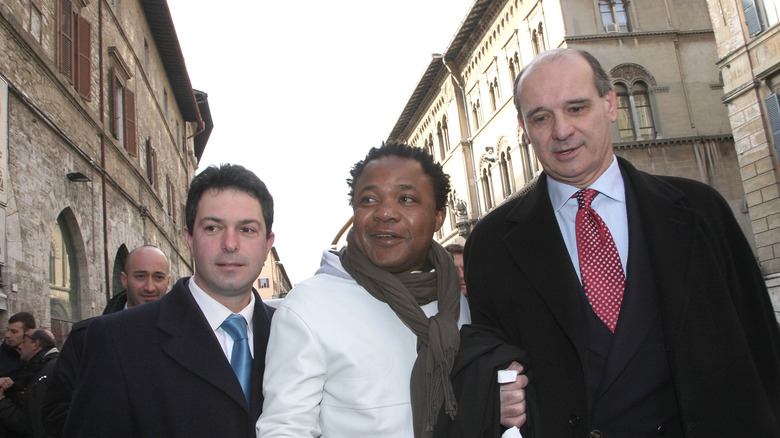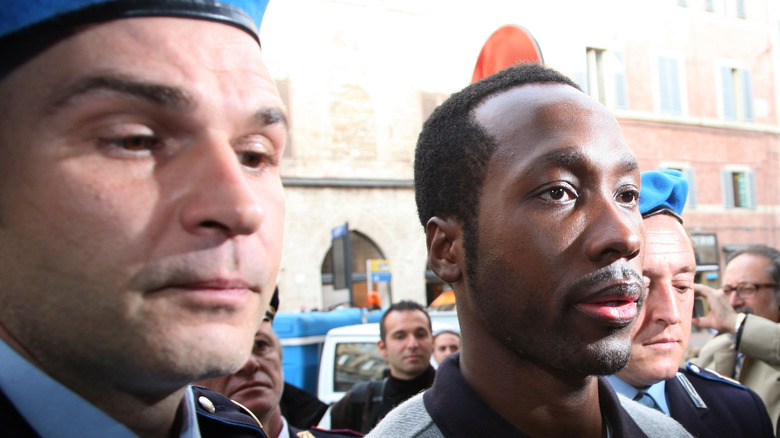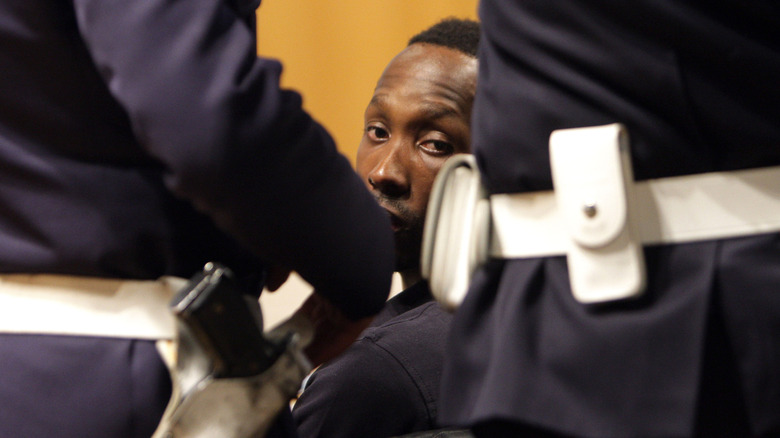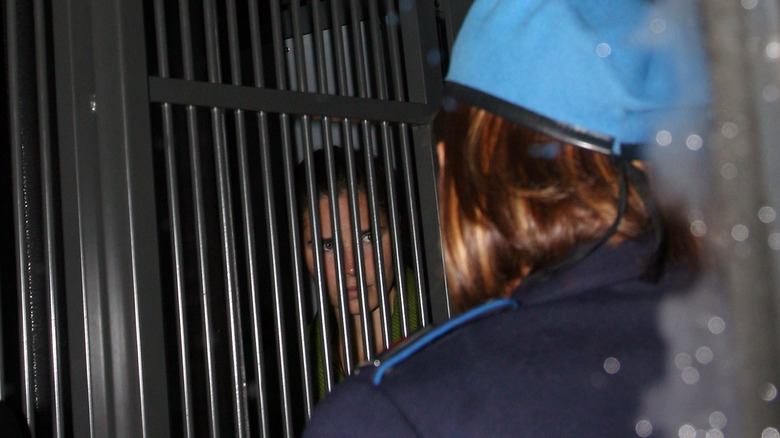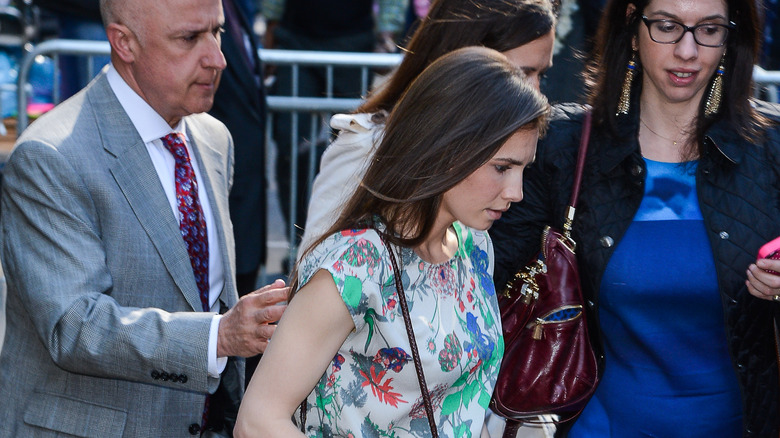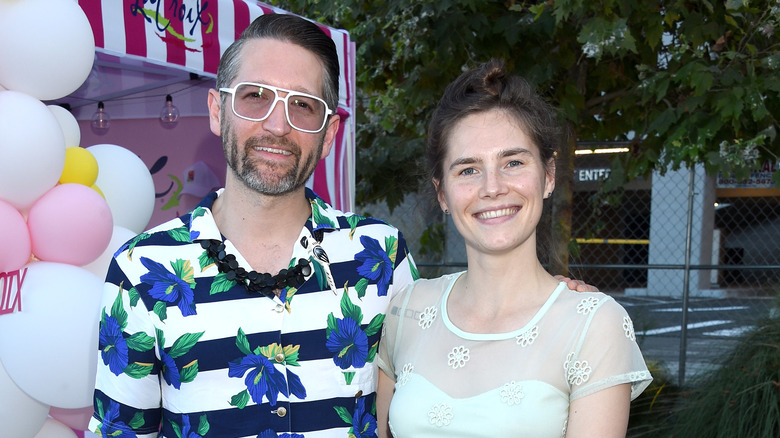A Complete Timeline Of Amanda Knox's Murder Case
It is one of the most gripping and jaw-dropping stories in recent criminal history, one that continues to make headlines more than a decade after the crime was committed.
On November 1, 2007, Italian police discovered the body of 21-year-old British student Meredith Kercher in the apartment she shared in Perugia, Italy, with Amanda Knox, then just 20, a Seattle-born exchange student, and two female students from Italy. Kercher had been brutally murdered, but the circumstances of her death and the possible involvement of Knox and her Italian boyfriend, Raffaele Sollecito, saw the investigation undermined and sensationalized by an international media circus. It has spawned documentaries, hit movies, podcasts, and countless column inches as the details of the case have been chewed over time and time again, with the reality of what really happened that fateful night gradually and painfully coming to light.
And though the case has now, on paper at least, been settled, the details continue to be hotly debated. Here are the decisive moments in this controversial legal saga.
September 2007: Arrival in Italy and a runaway romance
Amanda Knox and Meredith Kercher arrived in Italy just days apart in September 2007 and became roommates after answering classified ads on a student message board at the university, according to ABC News. The pair quickly integrated into Perugia's lively student partying scene. Beneath their shared student apartment lived four Italian students, who regularly partied and mingled with the girls upstairs. News reports from the year of the murder claim that Knox was a "lightweight" when it came to alcohol, but that she was a naturally social person who harbored few suspicions when it came to meeting new people.
And far from living in parallel, the two were active friends. According to ABC News, before her death, Kercher had accompanied Knox to a classical music performance in the town. It was here that Knox first met Raffaele Sollecito — whom she nicknamed her "Italian Harry Potter," per Biography – with whom she would begin a whirlwind romance. It was the dream beginning to Knox's student life, but seven days later her world would be dramatically torn apart.
Knox arrived for her studies in Italy in September 2007 and quickly began a relationship with Raffaele Sollecito, a fellow student she met at a classical concert. Referring to him as the "Italian Harry Potter," Sollecito seemed to fulfill all Knox's dreams of a romantic life in Europe. But within a few short days, the Kercher would be dead, and the lives of everyone in the apartment changed forever.
November 2, 2007: The discovery of Meredith Kercher's body
The body of Meredith Kercher was discovered in her blood-soaked bed on November 2, 2007. Per ABC News, it was Amanda Knox who first raised the alarm that something may have happened to Kercher. The American student had apparently returned to their apartment that morning after having spent the night at the home of Raffaele Sollecito and found the front door hanging open. Her Italian roommates were out of town, as were the downstairs neighbors.
According to Filomena Romanelli, one of Kercher and Knox's Italian roommates, Knox called her to say that she had found blood in the bathroom and that she was worried about Kercher. However, she also told her roommate that she had taken a shower in the bloodied bathroom, which Romanelli found odd. Romanelli returned to the apartment with her boyfriend and their friend, Luca Altieri, where the three met Knox and Sollecito. Kercher's room was locked. After finding the British student's mobile phones seemingly hidden in a nearby patch of land, the concerned circle of students called the Italian police, but the officers were hesitant to break open the door to Kercher's room. It was then that Luca Altieri took matters into his own hands.
"Luca kicked down the door and went white, and Marco yelled 'sangue, sangue — blood!'" said Romanelli. Kercher's throat had been cut, while her bruised face showed signs of a violent struggle.
November 3-5, 2007: Knox and Sollecito are suspected
The hours and days following the discovery of Meredith Kercher's slashed body raised more questions than answers, as authorities and the media tried to piece together the chain of events that led to the British student's horrifying death. According to The Guardian, a postmortem examination provided evidence that "sexual activity" had occurred in the hours before Kercher's death, suggesting that her killing was the result of a sexual assault.
Kercher's roommate Amanda Knox and her Italian boyfriend Raffaele Sollecito were soon identified as suspects in the case. As noted by The New York Times, early details of Knox's behavior following the death leaked into the press. It was reported that, prior to being interviewed, Knox was performing "cartwheels" in the police station, and that she and Sollecito had resumed their carefree love affair by going to the mall to buy lingerie. Per Westside Seattle, Knox's supporters would later claim that, far from performing celebratory cartwheels, the suspect was privately doing the splits as part of a stress-relieving yoga routine when an officer walked in on her. Similarly, it would later be revealed that Knox was not shopping for provocative outfits, but simply buying underwear as she had run out (via The New York Times). But by then, a certain image of Knox had already been established in newspapers around the world.
November 6, 2007: Three suspects are arrested
Amanda Knox and Raffaele Sollecito were interviewed by Italian police separately following the murder of Meredith Kercher. Their contradictory statements would thrust the story further still into the glare of the world's media and would lead almost directly to their arrests. According to Biography, the Italian police failed to provide Knox, whose knowledge of Italian was limited, with an interpreter.
Per The New York Times, the American was interrogated in an intense all-night interview, for which she also had no lawyer present. Later, Knox would claim that she was hit in the head and forced to come up with incriminating details. Weary from lack of sleep and food and seemingly being threatened by the police, Knox eventually gave her interrogators a name: Diya "Patrick" Lumumba (pictured, center), the owner of a bar at which Knox worked. Per Biography, the exhausted Knox also gave the police her own confession, as a result of being presented with Sollecito's testimony that she might have left his house during the night.
Meanwhile, further details that implicated Knox and Sollecito emerged, including the apparent discovery of a knife belonging to Sollecito with Kercher's DNA on its blade, and Knox's on the handle, per The Guardian.
November 20, 2007: The arrest of Rudy Guede
But the presence of another suspect at the house on the night of the murder quickly became apparent to investigators examining the crime scene, who came across bloody fingerprints not belonging to any of the apartment's inhabitants, or Sollecito. Per Biography, it was discovered that the prints were those of Ivory Coast-born Rudy Guede (pictured, center), who was quickly named as a suspect. Guede had fled Italy shortly after the murder and was apprehended on a train near the German city of Mainz.
Per Biography, Guede was a friend of Kercher and Knox's neighbors, the young Italian men who lived in the downstairs apartment. Known locally as a petty thief but without a criminal record, the 20-year-old denied that he was responsible for the murder of Meredith Kercher, but admitted he was at the house when the crime was committed. Guede claimed he had encountered a mysterious male figure who he believed to be Kercher's killer.
Guede did not make any reference to the presence of Knox or Sollecito, whom he had met previously, in any of his original statements. Meanwhile, Lumumba received an alibi that placed him behind the bar he owned on the night of the murder, according to The Guardian, meaning he was ultimately released. However, Lumumba would remain in the headlines after accusing Knox of slander.
October 28, 2008: Guede is convicted of murder
All three suspects were held in prison until their trials began the following year. In September 2008, Rudy Guede's defense team announced that they would be pursuing a fast-track trial for the suspect in response to what they believed may be an orchestrated attempt by Amanda Knox and Raffaele Sollecito to frame the Ivorian in hope of exonerating themselves (via The Guardian). The request was granted by Judge Paolo Micheli during the pre-trial hearings, meaning that Guede would stand trial separately, before Knox and Sollecito. None was granted bail.
As Biography notes, the DNA evidence tying Guede to the scene of the crime was inescapable. As well as his fingerprints found on bloody spatter surrounding Kercher's body, his DNA was also found inside the victim. Guede claimed that rather than his having raped and murdered Kercher, the sex was consensual and that he had been in the bathroom when Kercher was killed.
According to The Guardian's Simon Hatterstone – a journalist with whom Knox undertook an interview by letter during her time in prison – Guede anchored his defense by laying blame for the killing on Knox and Sollecito. As a result, the judge – who had concluded that Guede must have had accomplices in the murder – ordered that the two should also stand trial for murder. The judge sentenced Guede to 30 years in prison, reduced to 16 for his identification of Knox and Sollecito.
December 4, 2009: Knox and Sollecito are convicted
On January 16, 2009, Amanda Knox and Raffaele Sollecito were put on trial for the murder of Meredith Kercher. Though investigators found no trace of their DNA at the crime scene, suspicion of their involvement ran rampant in the media. According to The Guardian, the pair's supposed guilt persisted in the public imagination primarily because of Knox's confession. Signed in the early hours of the morning after four days of interrogation and 14 hours without food, the confession was later retracted, and deemed inadmissible to the murder trial. But as the confession was also the document by which Knox implicated Lumumba, it still went before the jury in Knox's defamation case.
Biography notes that the prosecution's case leaned heavily on the sexual aspect of the murder, and characterized Knox as a manipulative, sex-crazed "she-devil" – a phrase actually used by the chief prosecutor, Giuliano Mignini. Prosecutors claimed that all three suspects had murdered Kercher as part of a sex game gone wrong. Outside the trial, the media had begun to circulate the nickname "Foxy Knoxy," found on the defendant's social media profiles, as evidence of Knox's promiscuousness. As The Guardian reported, however, the nickname was originally given to Knox at the age of just 13, and was in reference to her footballing abilities.
The pair were sentenced to 26 and 25 years respectively for their part in the murder. However, their outraged supporters claimed they had been the victims of a miscarriage of justice at the hands of the Italian authorities and legal system and that they would immediately appeal the verdict.
October 3, 2011: Knox and Sollecito win their appeal
Amanda Knox and Raffaele Sollecito's appeal finally began in June 2011, 18 months after the pair had received their guilty verdict. By which time, the two had already spent nearly four years in prison as a result of their bail being denied.
Throughout the appeal, the pair's lawyers raised concerns that the DNA evidence on which the prosecution had based their case was contaminated and unusable (via The Guardian). Part of the prosecution's case during the murder trial had been based on the discovery of a bra clasp apparently belonging to Meredith Kercher, a "critical piece of evidence," according to Science Direct, on which lawyers claimed Sollecito's DNA had been discovered, suggesting his involvement in the attack. However, this evidence had not been uncovered during the initial sweep of the crime scene, and was likely contaminated.
The appeal also heard the testimony of Rudy Guede, who stood by his implication of Knox and Sollecito, stating: "It is not up to me to decide who killed Meredith, but I have always said who was there in that house that cursed night" (via The New York Times). However, according to Biography, Guede was also questioned about a prison inmate who provided a statement claiming that, behind bars, Guede had admitted Knox and Sollecito were innocent. In October of the same year, Knox and Sollecito were finally acquitted in tearful scenes, with the judge overturning their convictions due to lack of evidence (per CNN). Following her victory, Knox left Italy and returned to the U.S. for the first time since her arrest in 2007.
January 30, 2014: Knox and Sollecito are again convicted
In March 2013, the Italian Supreme Court made the shocking announcement that they were calling Amanda Knox and Raffaele Sollecito to be tried again for the murder of Meredith Kercher. According to CNN, the retrial was called due to the possibility that vital evidence had not been considered, and that there were outstanding questions about the pair's inconsistent answers during their police interviews. According to The New York Times, the overturning of Knox and Sollecito's 2011 acquittal was met with shocked silence by those in attendance at Italy's highest court. Knox listened to the outcome of the hearing from her home in Seattle. Knox would remain in the U.S. when the retrial began in September that year, amid concerns from her supporters that she would be once again wrongly imprisoned, per The New York Times.
Adding another twist to the legal saga, the retrial upheld the 2011 findings: that Knox and Sollecito were guilty of the murder of Meredith Kercher. In a statement, Knox described the result as "painful," and claimed: "the prosecution's theory of my involvement in Meredith's murder has been repeatedly revealed to be completely unfounded and unfair." In January 2014, she was handed a 28-and-a-half-year sentence – increased to incorporate the accusation of slander against Diya Lumumba – with experts noting that there were grounds to apply for extradition. Sollecito was given a sentence of 25 years, and his passport was confiscated.
March 27, 2015: The definitive acquittal
After conviction, acquittal, and subsequent retrial, it may have seemed to Amanda Knox and Raffaele Sollecito that their lives were destined to become a never-ending Kafkaesque nightmare. Italian courts do not share the American justice system's concept of double jeopardy. But finally, in March 2015, the pair were definitively cleared of charges against them in the murder of Meredith Kercher.
In a statement released in September that year explaining the reasoning behind the acquittal, the Italian Court of Cessation explained that the investigation into the murder of Meredith Kercher had been undermined by "culpable omissions of investigative activity" and "contradictory evidence," meaning that the prior guilty verdicts were illegitimate, according to The New York Times. The same statement also touched on what many commentators had flagged from the start: that the "unusual media hype" the disturbing and sensationalized story had generated led to the "sudden acceleration" of judgments concerning the events surrounding the murder and the apportioning of guilt – an effect that "certainly did not assist in finding the truth," according to the court.
The family of Meredith Kercher was disappointed with the final ruling, which effectively brought the official investigation into Kercher's death to an end. "We expected more from the Italian judicial system," said the family's lawyer, Francesco Maresca, via CNN. "This is a failure to find justice for Meredith."
January 25, 2019: Knox is awarded compensation
Four years after her ultimate acquittal in the Meredith Kercher murder case, it was ruled by the European Court of Human Rights that Amanda Knox was due compensation from the Italian government, according to Australia's ABC News.
The sum of €18,400 ($21,000) awarded to Knox was a fraction of that sought in her claim, which numbered in the millions. In the context of a saga which, by then, had dominated more than a decade of Knox's life, the amount seems vanishingly small. However, as noted by ABC News, the compensation does not relate to Knox's false imprisonment, but rather to her treatment at the hands of Italian police at the time of her first interrogations. The ruling stated: "Ms. Knox had been particularly vulnerable, being a foreign young woman — 20 at the time — not having been in Italy for very long and not being fluent in Italian."
The relevance of the ruling for Knox was not, however, entirely financial. As the source explains, it was during the interrogations in question that Knox was deemed to have slandered her former boss, Diya Lumumba, a charge for which she was given a three-year sentence. Knox now contests that the compensation showing that she was mistreated during her interrogation means that she was therefore not accountable for slandering Lumumba and that her "conviction was unjust."
November 23, 2021:The release of Rudy Guede
In November 2021, Rudy Guede was released from prison having served 13 years of his 16-year sentence for the rape and murder of Meredith Kercher (via The Independent).
Amanda Knox reacted to Guede's release with a lengthy thread on Twitter, in which she stated: "Were [Guede] to actually acknowledge his responsibility, it would bring closure to the Kercher family, it would end the murky speculation around this case, it would restore my wrongly damaged reputation, and that of Raffaele."
Instead, in an interview with The Sun newspaper – a British tabloid – Guede maintained his innocence and reiterated his claim that Knox and Raffaele Sollecito were Kercher's killers, stating: "I've got blood on my hands because I tried to save [Kercher], not kill her ... they say others were there and that I did not inflict the stab wounds. I know the truth and [Knox] knows the truth" (via The Independent). Knox's husband, the writer Christopher Robinson, responded publicly to the attack on Knox stating that it was "cruel to Amanda as well as the Kercher family."




